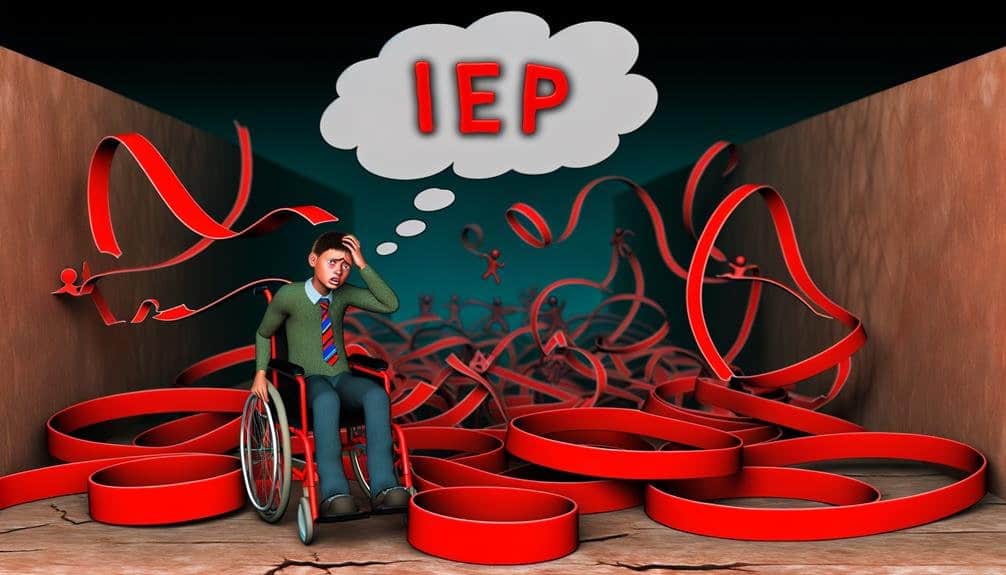What Happens if an IEP Is Out of Compliance?
So, you've just discovered that an Individualized Education Program (IEP) is out of compliance. Well, buckle up, because things are about to get interesting.
You see, when an IEP is not up to par, it can have some serious legal implications and consequences for everyone involved. But that's not all, oh no.
The repercussions extend beyond just the legal realm. Students with disabilities may be denied the services they desperately need, leading to setbacks in their academic progress. And let's not forget about the potential consequences for schools and educators.
But fear not, my friend, because there are steps that can be taken to address and rectify this non-compliance. Intrigued?
Well, read on, because we've got a lot to unpack.
Key Takeaways
- Non-compliance with IEPs can lead to legal actions such as due process complaints and litigation, holding schools accountable for not providing appropriate services.
- Denial of services for students with disabilities who have IEPs is a violation of their rights and can hinder their academic progress.
- Lack of compliance with IEPs can result in significant academic setbacks for students with disabilities, emphasizing the importance of providing necessary support.
- Non-compliance with IEPs can have financial repercussions for schools and educators, including potential fines and loss of funding, impacting resources and services for students with disabilities.
Legal Implications of Non-Compliant IEPs
Not complying with Individualized Education Programs (IEPs) can have serious legal consequences. When a school fails to follow an IEP, it can result in legal actions and potential violations of parental rights. Legal actions may include due process complaints, mediation, or even litigation. These actions aim to hold the school accountable for not providing the appropriate services and supports outlined in the IEP.
Parents have the right to file a due process complaint if they believe the school isn't fulfilling its obligations. This complaint initiates a formal legal process to resolve disputes. Additionally, parents can seek mediation services to help facilitate communication and find a solution that meets the needs of the student.
It's crucial for schools to prioritize compliance with IEPs to avoid legal implications and protect parental rights.
Denial of Services for Students With Disabilities
When schools fail to comply with Individualized Education Programs (IEPs), it can result in the denial of essential services for students with disabilities, potentially violating their rights and leading to legal consequences.
Denying services to students with disabilities not only hinders their academic progress, but it also goes against their disability rights. These students have a legal entitlement to receive the support and accommodations outlined in their IEPs.
However, when schools fail to provide these services, it places an undue burden on students and their families. As a parent, it's crucial to be an advocate for your child's rights and ensure that the school is fulfilling its obligations.
Lack of Progress and Academic Setbacks
Students with disabilities may experience significant academic setbacks and a lack of progress when schools fail to comply with their Individualized Education Programs (IEPs). This lack of progress can be attributed to a variety of factors, including a lack of support and limited parental involvement.
When schools don't provide the necessary support outlined in the IEP, students may struggle to meet their educational goals and make progress in their academic development.
Additionally, when parents aren't actively involved in their child's education and advocating for their needs, it can further hinder their progress.
It's crucial for schools to ensure that IEPs are followed and that students receive the support and involvement they need to succeed academically.
Potential Consequences for Schools and Educators
Schools and educators can face serious consequences when they fail to comply with students' Individualized Education Programs (IEPs). Not only does non-compliance impact the educational progress and well-being of students with disabilities, but it can also have financial repercussions for the school and its staff. Some potential consequences for schools and educators include potential fines and loss of funding.
Here is a table outlining the potential consequences of non-compliance with IEPs:
| Consequences | Description |
|---|---|
| Potential fines | Schools that are found to be out of compliance with students' IEPs may be subject to financial penalties. These fines can vary depending on the severity and duration of the non-compliance. |
| Loss of funding | Non-compliance with IEPs can also result in the loss of funding for the school. This loss of financial support can have a significant impact on the resources and services available for students with disabilities. |
It is crucial for schools and educators to prioritize and adhere to students' IEPs to ensure their rights are protected and that they receive the appropriate education and support they need. By doing so, schools can avoid these potential consequences and provide the best possible educational experience for students with disabilities.
Steps to Address and Rectify IEP Non-Compliance
To address and rectify IEP non-compliance, it's essential for educators and schools to take proactive steps in order to ensure the educational rights and well-being of students with disabilities.
If you find that an IEP isn't being followed, there are several steps you can take to escalate the situation and seek legal recourse if necessary.
First, document any instances of non-compliance, including dates, times, and specific details.
Next, bring your concerns to the attention of the IEP team, including parents, administrators, and other relevant parties.
If the issue persists, consider involving a mediator or filing a complaint with the appropriate state education agency.
Ultimately, if all else fails, legal action may be necessary to enforce the IEP and protect the rights of the student.
Conclusion
If an IEP is out of compliance, the consequences can be far-reaching. Students with disabilities may be denied necessary services, leading to academic setbacks and a lack of progress.
Schools and educators may face legal implications and potential consequences.
It's crucial to address and rectify IEP non-compliance promptly. By ensuring compliance, we can provide the support and resources needed for students to thrive, fostering a more inclusive and equitable education system.






